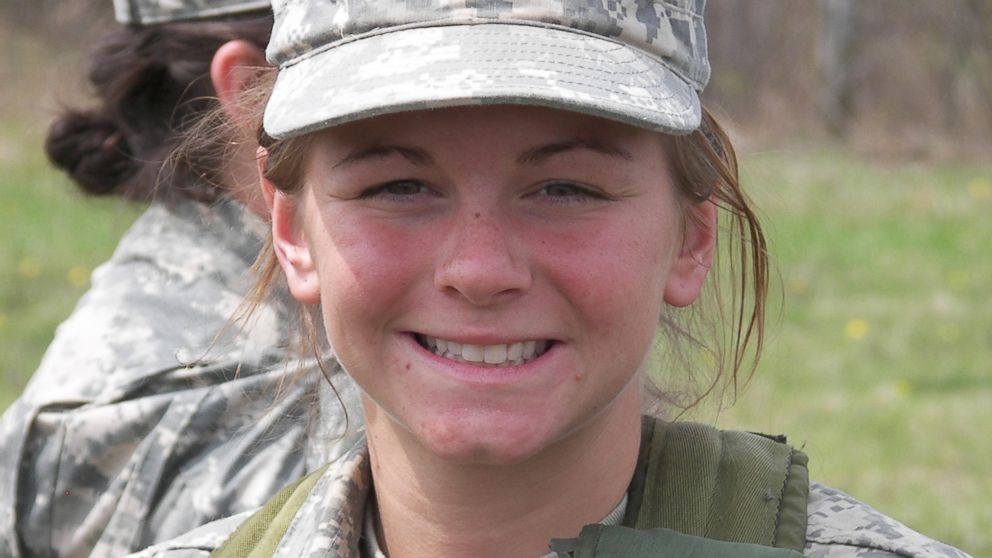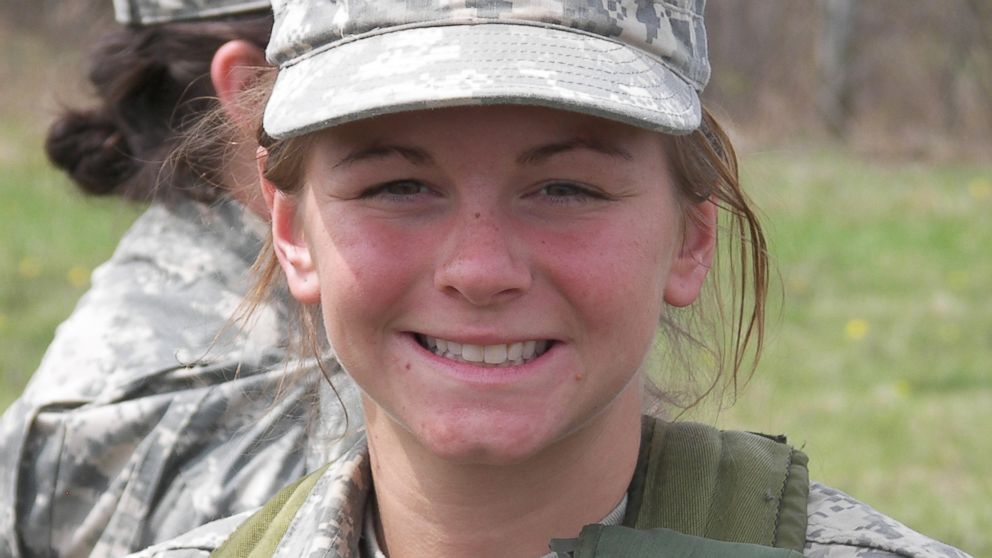Often women with language skills can glean info from women native to the country they are in, and having that training can greatly increase chances of survival. There are a lot off ways that women can serve in that capacity.
Exactly. They were called "Cultural Support Team"
Afghan women won't talk to men, let alone American military men.
Also the military found out that they had to put those female liaisons in a hijab to make the Afghan women feel comfortable enough to even talk to them.
Here's the story of one American woman who served in that capacity.
There are many unsung heroes in war, but there was a team of female American soldiers who assisted Special Operations forces during the Afghanistan War that few heard of.

abcnews.go.com
Inside 'Ashley’s War,' Story of a Special Ops Program That Put Woman in Afghanistan Warzones
New book "Ashley's War" focuses on a female soldier killed in combat.
By
MELIA PATRIA, MURIEL PEARSON, LANA ZAK, ELY BROWN, LUIS MARTINEZ and LAUREN EFFRON
April 21, 2015, 8:33 AM
9 min read
Copy and paste to share this video
View: https://www.youtube.com/watch?v=amsVrJ1EnP8
6:39
Inside Special Ops Program That Sent Women Soldiers to Afghanistan WarzonesABC's Diane Sawyer talks with the author of "Ashley's War" and comrades of fallen soldier, 1st. Lt. Ashley White.
— -- There are many unsung heroes in war, but there was a team of female American soldiers who assisted Special Operations forces during the
Afghanistan War that few had heard about until now.
The U.S. Army Special Operations Command created a program in 2010 called the Cultural Support Teams. They were special units of female Army soldiers that were meant to build relationships with Afghan citizens as Green Berets and Army Rangers searched compounds in the rugged desert of Kandahar.
In a new book, “Ashley’s War,” best-selling author Gayle Tzemach Lemmon details what these women went through in training and on these dangerous missions, focusing on 1st Lt. Ashley White Stumpf, who was among the first group of female soldiers to go into combat zones as part of a Cultural Support Team, or “CST”. Considered by many of her fellow soldiers as the ‘quiet professional’ and the ‘heart of the team,’ she was the first member of the special unit to be killed in action.
At the time, women were officially banned from combat, but they could be “attached” to one of these Special Ops forces for this purpose, which meant they were inherently in the line of danger.
“Women have participated in conflict for hundreds of years… but these wars are different,” said retired Gen. Peter Chiarelli, who served as the 32nd Vice Chief of Staff of the U.S. Army from 2008 to 2012. “From the time you entered in the countries of Iraq or Afghanistan, you were in harm’s way, whether you were male or female,” he explained.
The “CST’s” would do essential work that the male soldiers could not: they would interface with local women and children to gather information, because in traditional
Islamic culture it was considered inappropriate for men to commingle with women.
“This was 2011, the combat ban was still in place,” Lemmon said. “Most of America still doesn’t know that these women were out there. So they knew that everything they did would be not just their mistake, but every female’s mistake, and so I think they worked even harder.”
Capt. Meghan Curran, 28 from Chelmsford, Massachusetts, served alongside White in Afghanistan and said she was drawn to the Cultural Support Team when she first saw a flyer that said “Become a Part of History.”
"It kind of drew you in, you know, with the big bold heading,” she said.
“But, I don’t think that’s really what it was about for any of us,” she continued, “what it was about was the Army was asking for a certain set of women that were willing and able to do this certain mission.”
“We had that bond, that sisterhood,” said Emily Miller, 28 from Evansville, Indiana, a former platoon leader in Iraq, who also served with White and Curran in Afghanistan.
“I have always wanted to serve,” Miller added. “That’s why I wanted to be in the Army… and I wanted to prove that I could be valuable out there and really make a difference.”
One hundred women from across the Army tried out for the program, but only half survived the brutal training known as “100 hours of hell.”
“The common denominator was athletic, fierce and absolutely determined,” Lemmon said. “It’s about intensity and fierceness… and I think they all understood that.”
Curran said women would workout at the gym three times a day to stay physically fit and competitive.
“Girls would go workout during lunch, come back all sweaty and eat their lunch while the next class started,” she said. “Everyone knew that [physical fitness] was going to be a concern.”
Their training at Fort Bragg pushed them to the limits of human endurance in suffocating temperatures. Curran and Miller said they marched about 20 miles while carrying 35 to 40 pounds of gear, which included ammo crates. They also had to practice carrying a “buddy,” or fallen comrade, out of a combat zone.
“If I lacked at something, or if I had a weakness, one of the girls could make up for that weakness,” Miller said. “Somebody else always had the upper body strength that could help me carry the fallen comrade.”
At Fort Bragg, one trainer called Ashley White “the Megatron Quiet Blonde.”
“In the military, strength is so revered… and Ashley had it,” Miller said. “It was very much about showing it, not telling it… and I think they really respected that, the idea of the quiet professional.”
Her comrades said White could knock out 20 pull-ups at the gym, and yet loved to bake bread on base.
“She wasn’t afraid to be feminine,” Curran said. “She was a wife and she was a daughter… she had a soft side and she wasn’t afraid. She wasn’t afraid to be feminine and be a warrior at the same time.”
White, along with Miller and Curran, were at the top of their class and made the cut for this special ops attachment group. They headed to Afghanistan to join the rangers in 2011. The work was so secret, they could not even share details with their families.
Within one week of landing, Miller said she was given her first mission.
When she ran out of the helicopter upon first landing, she said, “all I could see, taste was just dust, just all around me… I couldn’t even find the area where I needed to be to, to rendezvous with the team and I just remember thinking, ‘how did I get here?’”
Miller said her biggest fear right off the bat was “messing up” around the men they were there to help.
“It was the fear of making a mistake that would hurt the team or not accomplish the mission,” Miller said. “That was the thing that weighed on my mind all the time.”
“We were attached, but we were not assigned,” Miller said. “They knew we weren’t Rangers, but we were on the same team.”
The women in the Cultural Support Team quickly learned how to interact with the foreign culture of a very conservative country.
“I learned the phrase, how to say ‘I’m a woman, don’t be afraid,’ and I would call out to them,” Curran said. “That would put them at ease right off the bat.”
Even their hair, the women said, was a feminine asset they relied upon.
“We would take off our helmet once the compound was secure and just kind of let our hair down,” Curran said. “Some girls wore braids… just to make-- be able to make that connection, let them see that we were women.”
However, they said, their uniforms made for men, looked not quite right on women’s bodies.
“Tight in all the wrong places, loose in all the wrong places is how I remember mine feeling,” Miller said. “That was one more reason to let your hair down when you were with the women and children… that was really important to really gain their trust.”
Ashley White’s mother Debbie White said her tiny, 5-foot-2 warrior daughter was shy as a child and struggled to keep up with her athletic siblings, so she never dreamed that Ashley would sign up with the military.
"She was always the quiet one from the day she was born,” Debbie White said. “She always had strength that… amazed us.”
When Ashley got her assignment, her mother said she thought her daughter was going over to “set up medical tents and take care of the women and children of Afghanistan.” Her daughter’s mission was so confidential that, up until her death, White’s family never knew the dangerous path she had chosen.
“The first we learned is when they brought her home,” her mother Debbie White said. “At Dover Air Force Base, they told us what she was really doing.”
In October 2011, White was on a routine mission when a nest of improvised explosive devices at a compound exploded and White was killed, along with two other Rangers.
“What they walked into was basically a booby-trapped compound,” Lemmon said. “And they were trying to figure out what was going on, and as they did, another soldier stepped on what was a daisy chain of IED.”
“It was hard because she was doing things I never, ever would have thought she would have done,” Debbie White added. “She did was she set out to do, and I’m proud of her.”
The last thing she every said to her daughter, Debbie said, was to “be careful.”
“And she hugged me and she says, ‘Mom, I’m with the best of the best. I’m going to be fine. I’ll be home quicker than you know,’ and she walked through the doors and that’s the last thing we said.”
Hundreds of people attended White’s funeral to show their respect for the fallen soldier. Debbie White has left her childhood bedroom in their Ohio home as a sort of legacy to her daughter, with her combat boots, helmet, and various awards on display.
“There are so many women out there who put themselves in harm’s way throughout the 13 years of this conflict,” said retired Gen. Peter Chiarelli, who served as the 32nd Vice Chief of Staff of the U.S. Army from 2008 to 2012. He said the CST’s performed “magnificently” and made a huge impact, showing some of the previous barriers in front of female soldiers have been “totally artificial.”
“Women are not as braggadocio as men are--they just aren’t and they haven’t told these stories,” he continued. “But these stories need to be told-- they need to be told for their children, for their families, for everyone.”
Lt. Ashley White’s fellow comrades continue to remember her as one of the bravest who fought alongside of them.
“[Ashley] was incredibly selfless,” Miller said. “And that’s, I think, one of the things you want out of your warriors.”
“When America and the Army asked for women to do this mission, she felt the need to say, ‘Send me,’ and I think that level of selflessness is extraordinary and uncommon and I’ll never forget that about her,” Curran added.
:quality(70)/cloudfront-us-east-1.images.arcpublishing.com/archetype/KWO6JINYVNAIRIC5EWNNIT7E54.jpg)
/cloudfront-us-east-1.images.arcpublishing.com/mco/KWO6JINYVNAIRIC5EWNNIT7E54.jpg)
/arc-anglerfish-arc2-prod-mco.s3.amazonaws.com/public/4ICQNCFU3JCKJCKFSKQZ4HMSEA.PNG)



